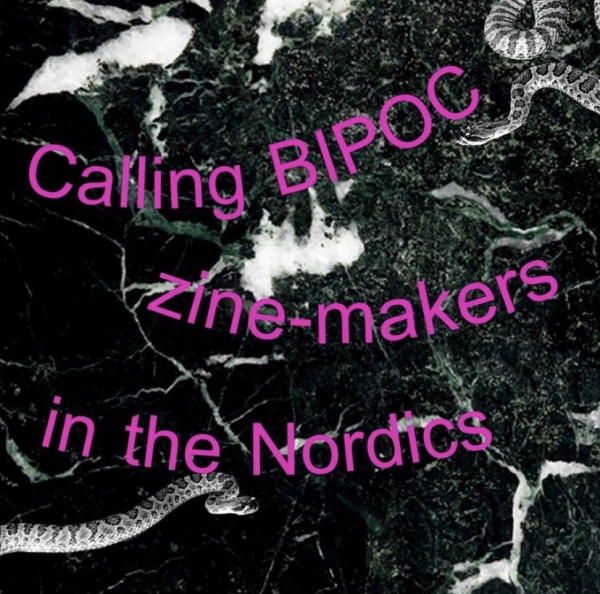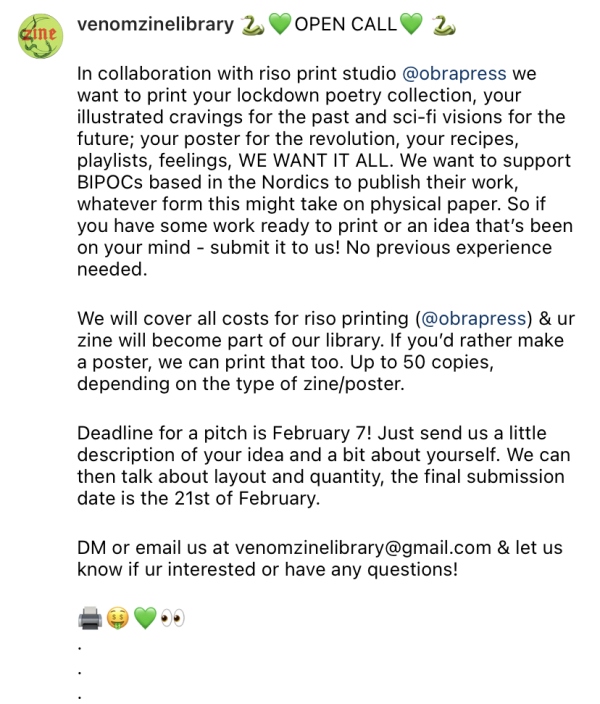Q&A with Venom Zine Library
At BABF, we’re always interested in new initiatives within the zine community, and when we stumbled upon the Copenhagen-based Venom Zine Library on instagram, we immediately wanted to talk to them about their initiative and experiences with starting up a zine library. And that’s what happened! Here’s a Q&A with Maya Acharya and Janna Aldaraji, the founders of Venom Zine Library.
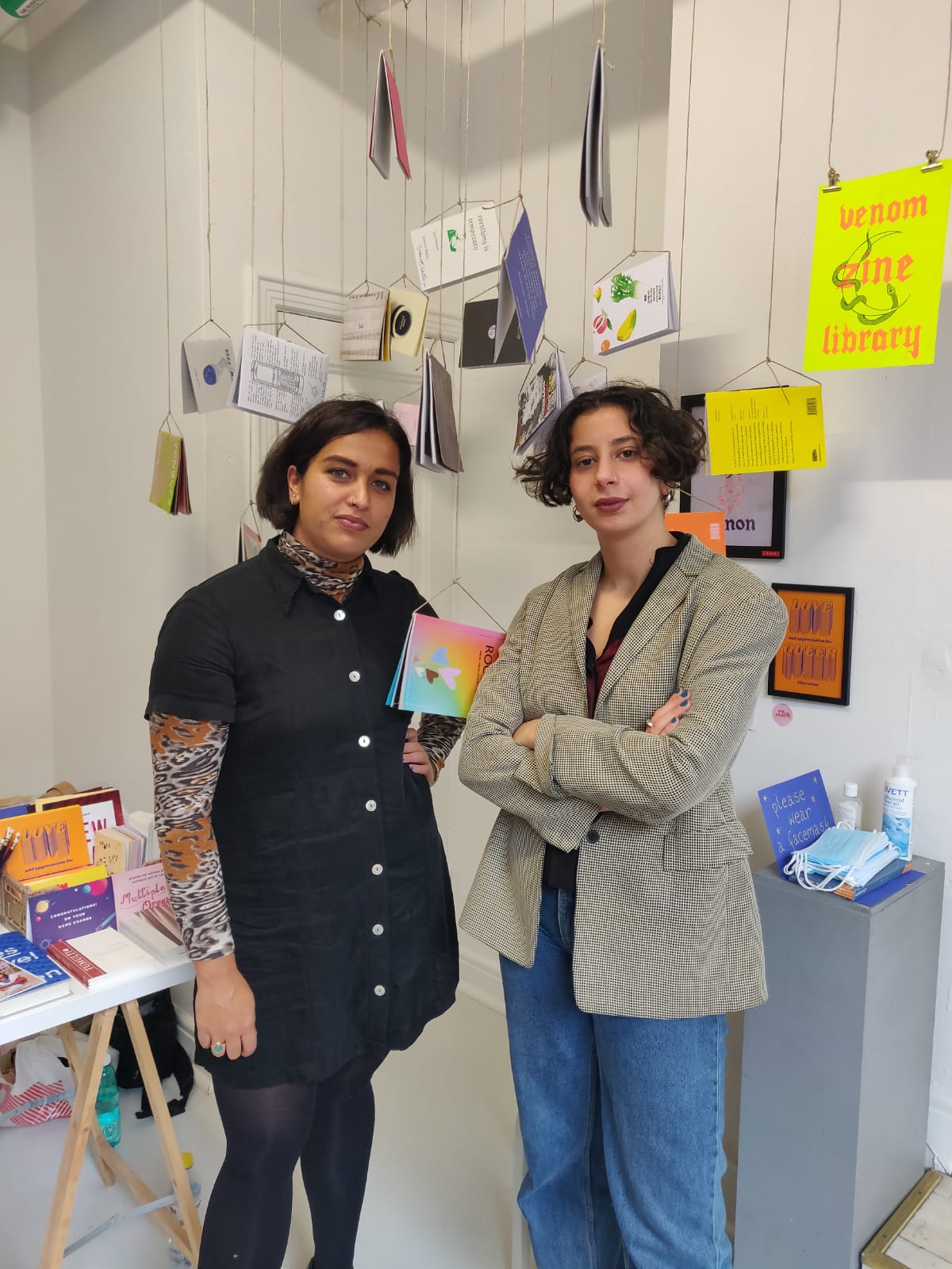
First of all – what is Venom Zine Library, and how did you come up with the name?
Venom Zine Library is a BIPOC (Black, Indigenous & People of Colour) zine library and platform for exploring self-publication, based in Copenhagen. We started the project in November 2020 and it came from a feeling we had that zines and self-publication weren’t as big of a scene as in places like the UK. We really believe in the potential of printing material as a transformative tool. So in envisioning the project we wanted to collectivise access to zines, share resources on zine-making and be part of building knowledge on self-publication.
Maya: We came up with the name when we were at a pub in London and wrote it down on a napkin. We liked the idea of subverting serpents as something evil/dangerous in (white western) imaginary – snakes symbolise many things including transformation, strength and regeneration. I was telling Janna about this Hindu story I grew up with about the god Ganesh and the moon. Basically, Ganesh goes to a party where he eats too many sweets (he loves sweets). He rides home on his mouse but a snake crosses his path so the mouse freaks out so Ganesh falls off and his stomach splits open. The moon sees all of this and starts laughing at Ganesh, who gets really pissed and throws one of his tusks at the moon, which is how the moon gets its crater. That’s also where the inspiration for our logo comes from, with the snake wrapped around the moon.
Janna: At the same time we like the idea of venom as something that infiltrates and poisons – so this idea of disrupting whiteness within DIY spaces.
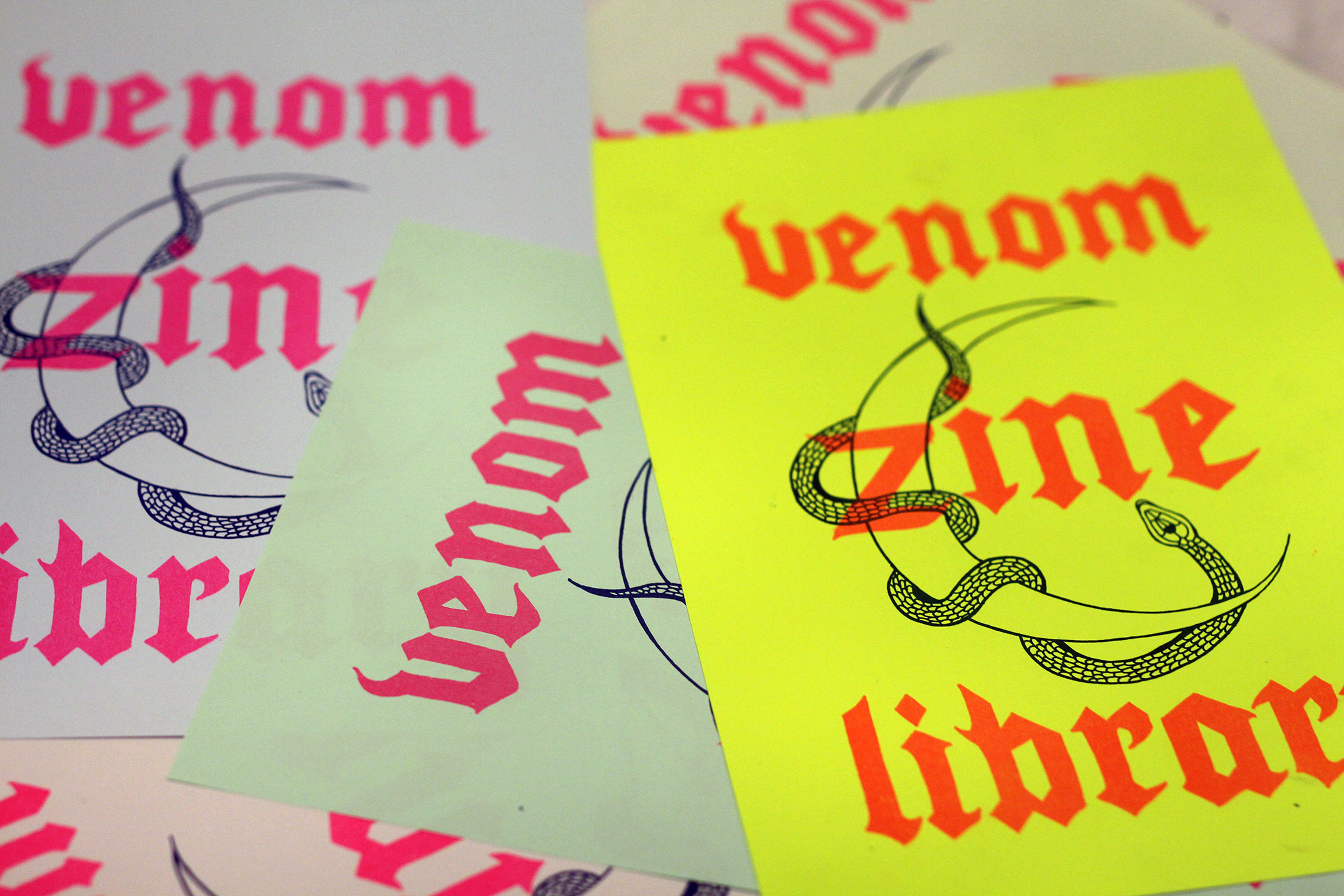
How did you first get in the zine community, and what was your experience with being there?
We both moved to Copenhagen some years ago, so neither of us were very familiar with the scene here, and only knew of a few BIPOCs working with small scale publication (for example the decolonial collective Marronage). Since starting Venom Zine Library, we’ve been lucky enough to connect with some really amazing people, like Abdul Dube, who is based in Aarhus and has been working with zines for a long time. Abdul also compiled a beautiful zine called ECHO last year (available online), which brings together many different voices to explore decolonial practices within and beyond Europe.
Since launching the project we’ve also connected with Obra Press who are a new riso print and publishing studio here in Copenhagen. We really appreciate that they want to make printing more accessible and collaborative. We are currently doing an open call where we’re inviting BIPOC zine-makers who are based in the Nordics to submit a project which will be printed at Obra Press with all costs covered by us. The zines/printed material can then be distributed by the artists in whatever way they want, and we will keep some copies for the library. We really want to encourage BIPOCs, especially those who have never made or printed a zine before, to try it out. There are more details about the open call on our instagram page.
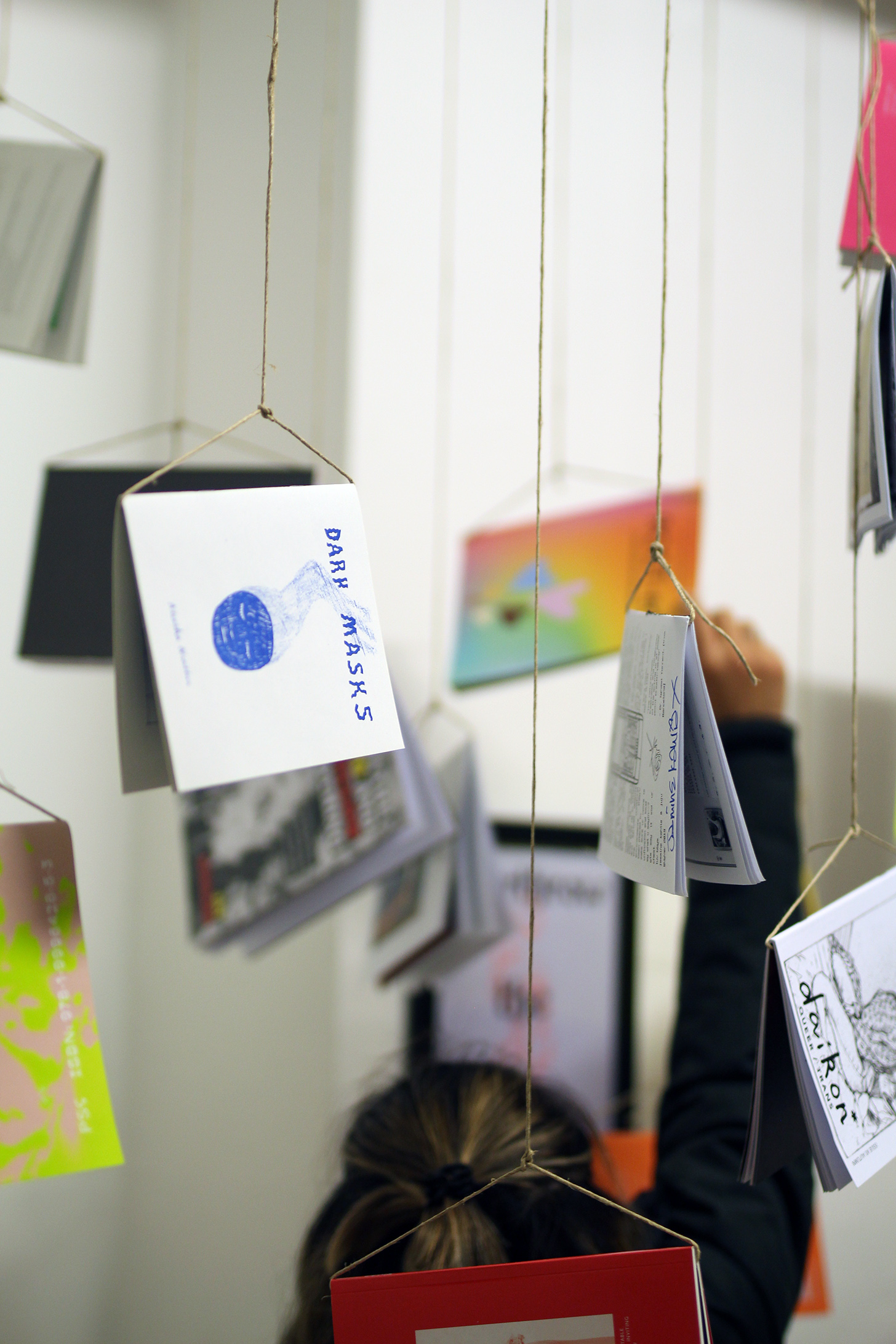
Could you present a couple of the zines you’ve collected so far?
We currently have around 120 zines in our library collection. It’s hard to pick cos we love all of them, but here are a few we’d like to highlight:
Pooling by Rochelle Roberts, it's an A6 zine on the ghostly and surreal printed by Tender Hands Press.
One of the zines that we picked up recently is Doesn’t it Set Your Teeth on edge by Subira Joy... It’s full of poetry that insists on the radical possibilities of rage. Subira is also part of the upcoming Trans Kink Zine, printed by Easter Road Press, which we are really excited for.
And lastly Together Apart, a collaborative zine project on queer indigeneity that explores themes from Indigiqueer futures and intentions in organising to first kisses.
I read that you met at a screening of an Audre Lorde documentary – could you tell us a little bit about yourselves and of your collaboration?
J: I am Janna (She/her) (Cancer😛) I am Iraqi-Moroccan, I grew up in a city close to Rabat and then in London. I am currently FUNemployed (jk we are still in lockdown in Denmark so not much fun and mostly just unemployed).
Meeting Maya was actually pretty romantic. I knew who she was because we had a friend in common and I had been stalking her website for a magazine she made called Masq. We were sitting next to each other at this screening, and after the documentary ended I creepily said hi and invited her to the launch of my zine the coming week and we never looked back!!
M: Haha yes, total whirlwind crush. I’m Maya (she/her). Scorpio 😈 I’m Nepalese-Ukrainian, grew up in Nepal, then the UK, then Northern Norway. Moving back to Scandinavia in my mid-20s was kind of a shock to the system so it meant a lot to me to find people I could connect with, especially around words and literature.

Both of you also have academic backgrounds or are still in academia. What do you work with right now, and how does the work you do there connect to your other projects?
M: Yeah we both studied Migration Studies (and bonded over hating it lol). I started a PhD last year on anti-racist student movements and I feel like a lot of the questions I come back to, around whiteness, decolonisation and imagining alternative ways of building and sharing knowledge relate a lot to Venom. I want to learn more about publishing and archiving, and there’s something about the way that zines envision futures and possibilities that really appeals to me. Academia can be an oppressive and creepy place to be so it’s also really nice to be able to connect over texts & things that inspire us – for example Janna recently sent me an amazing video about skin and slime that I was very into.
J: My relationship to academia is complicated... I just finished my masters and I’m trying to figure out if I want to continue with a PhD. My hesitancy is with the academy being such a toxic and white space. It feels overwhelming to be in an institution that is so rigid but I am inspired by the BIPOCs who continue to make space for us there. I would love to continue working with how we can inquire into bordering and racialisation processes through decolonial methodologies. Zine making is very central to this, for example for my thesis research I made a reading group where at the end of the process we collectively made a zine with our poetry. I think it’s exciting that zines are being used more in academia, like I saw on Twitter that a professor set as an assignment for her class to make a zine to express what they learnt that semester instead of an essay.
The nature of zines can be a bit fleeting, with limited editions and often little to no distribution. What do you think is the purpose of archiving and collecting with a focus on projects made by BIPOC?
Archives are spaces of power in the way that they control what material, stories and experiences are collected and how; and who/what gets remembered. It’s important to us to create space for BIPOC knowledge to be centred when historically these narratives have been warped and erased. At the same time, archives are also living matter that we think have potential for re-imagining and re-remembering. We don’t see the library as something static – a catalogue of the past – but instead want to think of ways that it can be actively used and expanded to make new impressions in the present.
Maya, you’re also one of the founders of (un)told pages, a pop-up bookshop and festival featuring BIPOC authors. How did that project come about?
M: I started (un)told pages with my friend Elisabeth Bruun Gullach. It came out of the usual combination of frustration/drunken hype and the desire to create literary spaces for BIPOC. We held our first festival in Copenhagen in 2019. Since then we’ve been working on smaller events, pop-ups and launching a webshop. We published an online audio anthology last year, & are dreaming of a permanent bookshop one day.
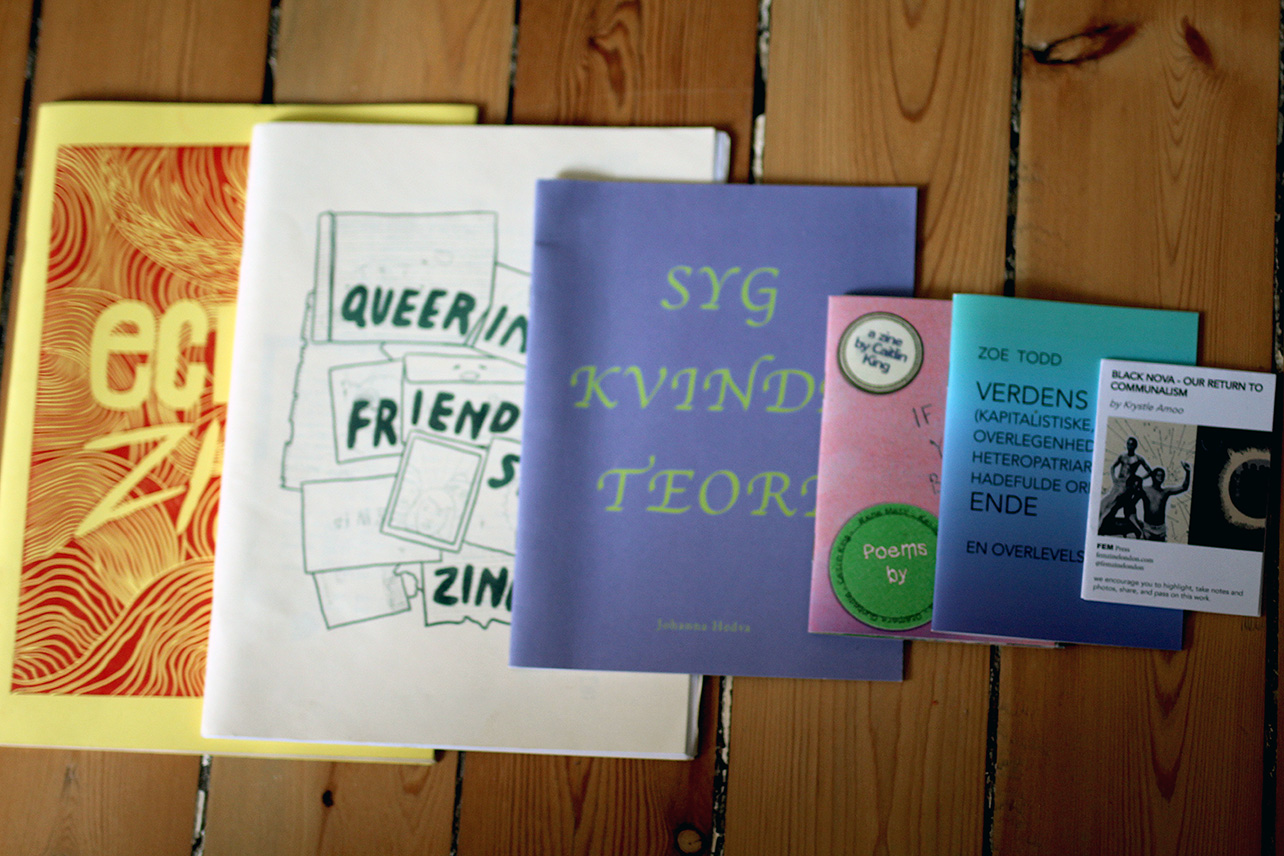
I feel as if for a long time in the Nordics, the collective discussions concerning race have focused on this naive idea of “not seeing colour”, and seeing racism as the cruel actions of some individuals that you don’t know. Amongst other things, I think that a project like venom zine library challenges that old norm. Do you see changes in that view in the Nordics nowadays?
The conversation around race in Denmark is very basic which is frustrating because it is always the same debates that play on loop, that don’t move us anywhere and are often just blatantly racist. We think it’s important to create spaces that don’t centre whiteness, but are carved out by and for BIPOC. For example, we are really inspired by projects like Brown Recluse Distro and Migrant Zine Collective for the ways they connect and celebrate BIPOC narratives.
What are your hopes for the future of Venom zine library?
We would really love to have a physical space for the library, where we can also host regular workshops and talks. We want to facilitate sharing knowledge of self-publishing within communities so our stories, experiences and propaganda is easily spread. This would hopefully also be by creating access to materials and printing (if you have a cheap riso printer hit us up haha).
It’s also been really good to connect with zine makers and publishers, especially in the Nordics, so we hope to do more of that; it would also be amazing to visit some of the international big zine archives and maybe even do a residency one day so we can learn more about publishing. Next week we are going to spend a few days working on funding applications so we can hopefully get some €€€€$$$$ to invite some of our crushes to facilitate workshops in Copenhagen. Hoping for a lot of funding!
